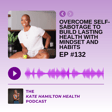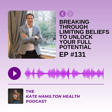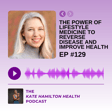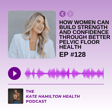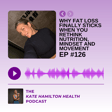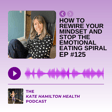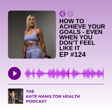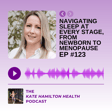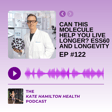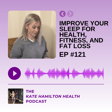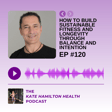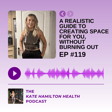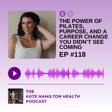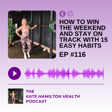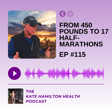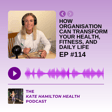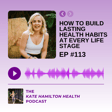
#111: How to finally understand and overcome your migraines
In this episode of The Kate Hamilton Health Podcast, I sit down with Diane Ducarme, Founder & CEO of Migraine Heroes, to explore the true root causes of migraines - and how to break free from them for good.
If you’re stuck managing migraine symptoms instead of finding real relief, this episode is for you. Diane blends Eastern medicine, Western science, and cutting-edge tech to offer a holistic, science-backed approach. With an MBA from Harvard, a background in science and engineering, and studies in Traditional Chinese Medicine and neuroscience, she brings a unique perspective to migraine care.
We dive into hormone imbalances, gut health, inflammation, the vagus nerve, and how perimenopause and menopause affect migraines. Diane also shares self-advocacy strategies, lifestyle shifts, and practical tips to help you take control of your health. Whether you’ve tried medications, alternative therapies, or are still searching for answers, you’ll walk away with actionable insights to finally understand and overcome migraines.
Episode Breakdown:
[00:00] Intro to today’s episode
[00:13] Meet Diane Ducarme
[00:23] Understanding migraines beyond headaches
[01:04] Holistic migraine relief
[01:42] Diane’s journey & expertise
[02:25] Living with chronic migraines
[05:27] The science behind migraines
[05:32] Eastern vs. Western approaches
[08:46] Hormones & migraines
[11:05] The vagus nerve & gut-brain connection
[14:41] Perimenopause & migraines
[20:29] Self-advocacy in medical care
[24:55] Lifestyle changes for relief
[28:50] Gentle detox & diet tips
[29:12] Breakfast & intermittent fasting
[32:06] Coffee: friend or foe?
[36:29] Gut health & migraines
[40:33] Inflammation’s role
[43:17] Stress management strategies
[46:08] Combining Eastern & Western medicine
[49:43] Supplements for migraine relief
[52:42] Conclusion & resources
Links & Resources:
- Visit Diane’s website Migraine Heroes here
- Take the free test here
- Connect with Migraine Heroes on Instagram here
- Download the Migraine Heroes app on the Apple Store here
- Download the Migraine Heroes app on the Google Play Store here
If you enjoyed this episode, please subscribe, leave a review, and share it with friends who might benefit. For more health and fitness tips, follow me on Instagram and TikTok @katehamiltonhealth.
Music b LiQWYD Free download: hypeddit.com/link/xxtopb [http://hypeddit.com/link/xxtopb] Promoted by FreeMusicPromo [https://www.youtube.com/channel/UCbycji-eySnM3WD8mbxPUSQ] / @freemusicpromo
